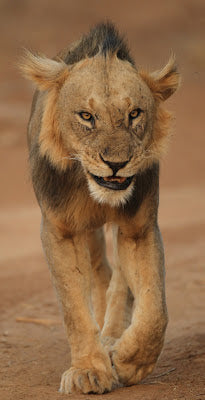Many of the animals found in Samburu are unique to this northern region of Kenya - including these mane less lions.
It is not known why these mature males do not have much of a mane. Some believe it is because it is so hot in this dry, arid region. But a more plausible answer is that the scarcity of prey here means that the males play a more important role in hunting and don't want to be weighed down with heavy manes.
In comparison the hairy male lions in the Masai Mara rely mainly on the females in the pride to hunt.

There are only about 12 lions in Samburu and again this sparse population is probably due to the scarcity of prey. These two pride males were a formidable pair. They were known to take baby elephant and giraffe.
Among the most remarkable of Samburu wildlife is the Grevy's zebra. Tall in stature, with narrow stripes they have distinctive round, Mickey-mouse ears which reduce them to the comical! Grevy's zebra have a totally different social structure to Africa's other zebras. The males hold a territory and are mainly solitary, mating with females that they come across rather than holding a harem of females like stallions of other subspecies.
The gerenuk antelope is also unique to this region. It browses on bushes on its back legs and is able to reach branches that are higher than other antelope can reach and lower than giraffe can eat.
I'll leave you with just a few final images from the trip I led to Kenya. It really was a special safari and the final spell spent at Elephant Watch Camp in Samburu was amazing. I can't wait to go again.
It's always a treat to see leopard and we saw this one twice in Samburu..
These dwarf mongese warming up in the morning sun were fun.
And I loved this stunning Agama lizard.
Oh and this crocodile.























